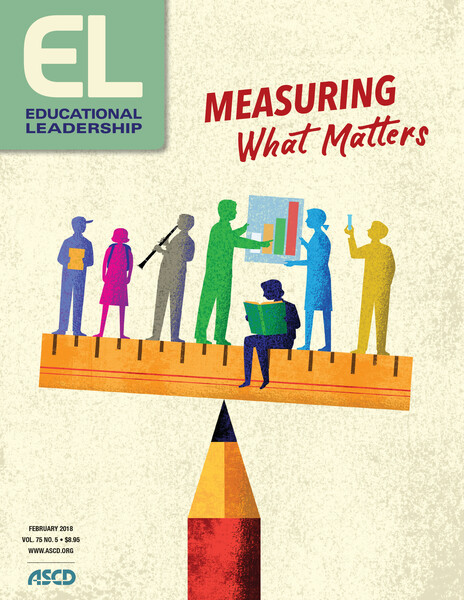At the end of his book Better: A Surgeon's Notes on Performance (Metropolitan, 2007), the doctor-writer Atul Gawande offers a list of recommendations for becoming a "positive deviant" in your profession—that is, someone who makes a difference. One of his suggestions is simply to "count something." He explains that by systematically tracking or documenting an important element of your work—he uses the example of the number of sponges left in surgical patients at his hospital—you begin to understand the underlying dynamics of the issue and can work toward making meaningful improvements.
"If you count something you find interesting," Gawande writes, "you will learn something interesting."
I thought of this bit of advice as we were working on this issue of Educational Leadership on measurement in schools, but I couldn't put my finger on its exact relevance at first. After all, as we all know, educators are already subject to a lot of "counting" and data analysis in their work. The point of this issue certainly wasn't to remind them of that fact or tell them they need to do more of it.
Then it hit me: The word "interesting" in Gawande's statement is key. Count something you find interesting. In their different ways, many of the articles in this issue are at heart appeals for schools and educators to count or measure something of true interest—or, as the authors might put it, something meaningful—to gain deeper insight into students' real learning progress and needs. The underlying assumption, of course, is that, due to the outsized role of standardized tests in schools in recent years, many educators feel that what and how they are being asked to count now is not always all that interesting or informative—or even particularly reflective of what really matters in their classrooms.
In the opening article, Jay McTighe frames the topic of measurement in schools closely along these lines. He observes that assessment in many schools is still primarily designed to measure students' grasp of basic skills and factual knowledge, even as educators are placing a growing emphasis on more complex capabilities like conceptual understanding and long-term transfer skills. To measure these types of higher-order skills, McTighe argues, schools must "make greater use of authentic performance-based measures" in which students are asked to apply their learning and explain their reasoning. This shift, coupled with more traditional forms of exams and progress monitoring, can give educators a more holistic understanding of student growth.
In a related piece, math teacher John R. Troutman McCrann argues that the "power dynamics in educational assessment" over the past three decades have curbed teachers' authority "to evaluate learning and assess growth," leading to a disconnected, sometimes demoralizing system. To create more meaningful forms of assessment and deepen conversations around student learning goals, he writes, school leaders need to take steps to put the "power over those conversations back where it belongs: in the hands of those closest to our students."
To that end, the authors in this issue provide a range of practical ideas for recalibrating educational measurement so that it is more responsive to teachers' needs and more reflective of authentic learning. Lee Ann Jung, for example, offers a primer on a nuanced system for tracking individual skill goals over time. Joe Feldman discusses the need for educators to transition from grading via "blanket point totals" to using descriptor scales to capture levels of standards mastery. And Nancy Frey, Douglas Fisher, and John Hattie suggest ways to help students better understand and reflect on their own learning progress—an essential component of self-efficacy. Other articles venture into the relatively new frontiers of tracking social-emotional learning and using games as a method of formative assessment.
So go ahead: Be a positive deviant. Count something of real interest in your school or classroom. We hope this issue gives you inspiration and ideas for going deeper into your craft and finding new ways to understand and meet students' learning needs.







